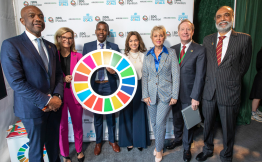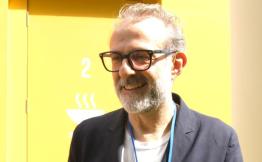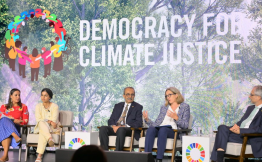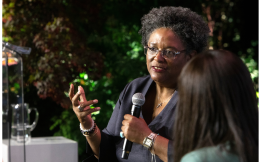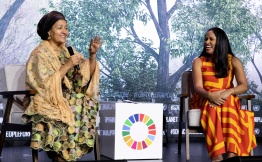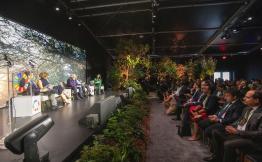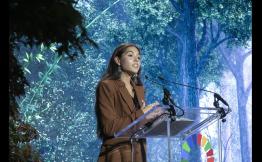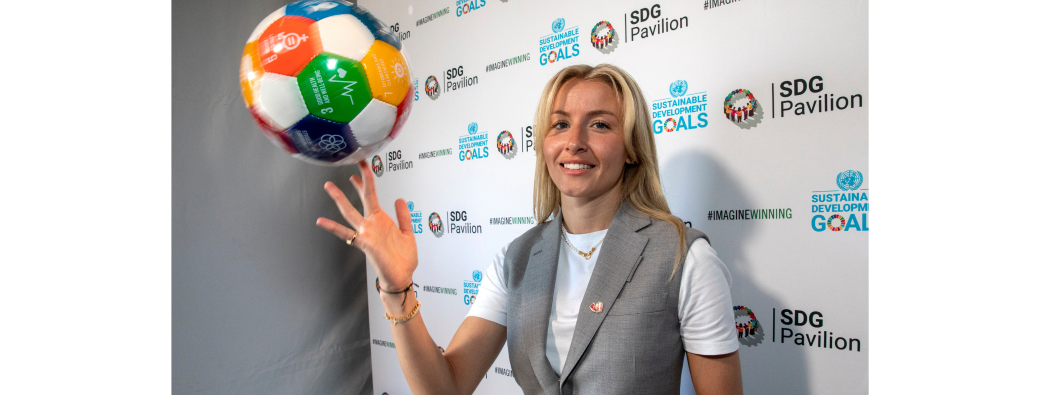
Elevating education as a win-win for the SDGs
For many children, education isn’t working: hundreds of millions are out of school and, of the billions who are in school, most are not acquiring the skills they need to succeed. By 2030, without investment and commitment to the transformation of education, we will not have addressed this persistent, widespread twin crisis of equality and relevance: 84 million children will be out of school, and 300 million more who attend school will still lack basic numeracy and literacy skills to thrive in a rapidly changing world.
Despite these challenges, the outlook for these children can be improved, with the right approach to investment, and support for equity of access, giving them the tools they need for their futures.
Youth voices, education advocates, government officials, renowned athletes, civil society and private sector representatives took part in the Elevating Education event on Tuesday morning, bringing their expertise on topics from educational climate justice, to empowering young people with the skills they need to thrive.
The session was opened by Vee Kativhu, one of the UN Young Leaders for the SDGs, who shared her own journey from education to activism. She will invite the audience to imagine winning for education from their own points of view.
The first panel of the session, focused on climate education, was moderated by Temilade Salami, Founder & Executive Director, EcoChampions and Global Partnership for Education Youth Leader from Nigeria. Julieta Martínez, the founder of Fundación Tremendas in Chile, pointed to the link between social justice and the climate crisis. “You have people from government that say ‘if you want to care about the environment, instead of using the car, use public transport’. What if I really want to care about the environment but I cannot use the bus because it is not safe?”
She went on to ask for better youth representation in policymaking, a theme taken up by high school student from Kapālama, Honolulu, Hawaii, Mr. Mason Ozaki. “Each and every one of us matters. Each of us should have a voice, no matter what pay you get, no matter what race or gender you are, everyone should have a voice at the table, especially the youth”. Egoitz Etxeandia, Climate Champion at Teach For All, agreed that young people need to be heard. “They want to be listened to, they want to lead the change of the future and in the present”.
Sandrine Dixson-Declève, Co-president of The Club of Rome and Co-Lead of the Earth4All Initiative, declared that education needs to be thought about in a different way, because today it is about “realizing that we are all students and we are all teachers. And it’s putting in place the learning and the knowledge exchange that is necessary to face the challenges that we have before us”.
Leah Williamson, professional footballer for Arsenal Women, and captain of the England women's national team, embraced the SDG Halftime analogy, and agreed that there is everything to play for in the second half. "When you start the game there's a complacency because you know you have so much time to go. Then you get to half time and realize the walls are closing in and the pressure builds up. You have to make every second count."
Ms. Williamson works with Coaching for Life, a programme which supports the mental health and well-being of children affected by violence. She explained that sport and non-formal education can empower girls and young women, because it gives them the confidence to believe that they can achieve their dreams.
As the world of work changes, how can education keep up? This question was at the heart of the final panel of the session. Inés Yábar, Lead Next Generation Fellow at the UN Foundation, moderated the discussion between Leonardo Garnier, Special Adviser to the Secretary-General for the Transforming Education Summit; Elizabeth Faber, Chief People and Purpose Officer at Deloitte Global; Fahad Al-Sulaiti, CEO of Education Above All Foundation; and Ivy Murugi, Youth Representative of the World Organization of the Scout Movement.
At the heart of the education crisis, said Mr. Al-Sulaiti, is a system that is no longer fit for purpose. He called for innovative financing and a commitment from governments to increase their commitment for education. “This is the commitment that we want,” he said. “That we set a target and others to come and focus on that target with you. This is what we’re advocating strongly for.”
Mr. Garnier pointed out that the world has never been as rich as it is today. “So, when we say ‘there is no money’ I say, what do you mean there is no money? There has never been as much money as today”. What we have seen in the last 30-40 years is an increase in inequality and a concentration of wealth and a concentration of income. So, financing education today means redistribution. The decision to redistribute income to finance education in the end will benefit us all.”
The private sector plays a key role in unlocking this win-win for education, according to Ms. Faber, because “it brings innovation, and investment, and scale; And innovation in terms of diversity in our talent pipeline and diversity of our thinking and unlocking some of these creative solutions, working together with our partners in these broader ecosystems”.
Ms. Murugi expressed her belief in going beyond formal education, to include practical and soft skills, and for investment in these skills. “It all boils down to action,” she said. “Let’s stop saying young people are the leaders of tomorrow; when companies and organizations and other stakeholders are making decisions, let them involve young people right at the start. They have innovative ideas they want to share so involve them right at the beginning”.
The session concluded with H.E. Chief Minister of Sierra Leone David Sengeh looking to the future, and how to ensure that remains top of mind for those in government positions and leadership positions.
Mr. Sengeh was bold in his predictions for the second half of the SDGs, and the likelihood of making good progress before 2030, but he called for a new wave of leadership and accountability.
“We must ensure that these global benchmarks processes are respected. We have to hold ourselves accountable and know that these are not just flexible things that we wrote. We committed to them. We sat and we imagined that we could do them by 2030, and it’s not impossible”.
Watch the session again [HERE]




